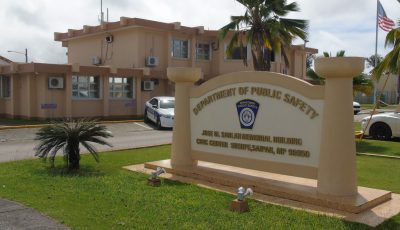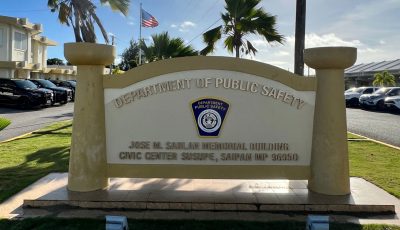Judge raps police for illegal use of traffic stop
Superior Court Associate Judge Joseph N. Camacho reminded the prosecution and the Department of Public Safety yesterday that it is illegal to use a routine traffic stop as a pretext to conduct a drug search.
Camacho made the admonition before granting the Office of the Attorney General’s oral motion to dismiss the drug case against Dusty N. Nisarafach without prejudice. That means the prosecution may re-file the case in the future.
Nisarafach, 48, was immediately released from custody.
Camacho said both the U.S. and the CNMI constitutions protect an individual’s right to illegal searches and seizures.
Nisarafach was pulled over by police for traffic violations in Kagman 3 in the early hours of Dec. 21 and he was allegedly found in possession of methamphetamine or “ice” and other drug paraphernalia.
Nisarafach was arrested for illegal possession of a controlled substance. He was also cited for having an expired vehicle registration and not having a driver’s license.
At yesterday’s preliminary hearing, police detective Andrew S. Taimanao testified that police officer Rudolfo Hermosilla, a former Drug Enforcement investigator now assigned to DPS patrol unit, made a traffic violator stop on Nisarafach based on an expired registration. When Nisarafach stated he did not have his driver’s license with him, Hermosilla arrested him.
Camacho said that, based on the testimony, Hermosilla proceeded to conduct a drug search of the vehicle under the guise of an inventory.
In Taimanao’s written report, he stated that while one officer was talking to the driver, identified as Nisarafach, he noticed a white ziplock baggy with a glass tube in it hidden on the side of the driver’s seat and the center console.
Camacho said he inquired if Hermosilla made the arrest based on the traffic violation or a criminal offense, and that Taimanao testified that Hermosilla made the arrest based on the traffic violations.
Assistant attorney general Elizabeth Weintraub then made an oral motion to dismiss the case without prejudice. Camacho granted the motion to dismiss.
In admonishing the prosecution and DPS, Camacho said a warrant based on probable cause and signed by a judge is necessary to conduct a search.
“There are very limited exceptions to conduct a warrantless search (which still needs probable cause). None are present in this case,” the judge pointed out.
Camacho said a person has an expectation of privacy when driving on a public road, and that if there is a minor traffic violation the proper procedure is for the police to issue a traffic citation.
Camacho said the law allows an officer to make an arrest for a serious traffic violation such as driving under the influence, reckless driving, eluding a police officer, and others. He said an officer can also make an arrest if the person refuses to sign the traffic citation.
Camacho said none of these situations occurred in Nisarafach’s case.
The judge also noted what he described as a “disturbing pattern” in the past couple of months where DPS officers use routine traffic stops as an illegal pretext to conduct drug searches.
“The court now admonishes these officers to stop these illegal and improper actions as it violates the Constitution,” Camacho said.
To assist the officers and prosecutors, Camacho briefly listed what the U.S. Supreme Court has stated on the issue of search of vehicles.
Assistant public defender Tillman Clark served as counsel for Nisarafach, who has a previous “ice” case.
On Feb. 12, 2013, Nisarafach pleaded guilty to the offense of possession of controlled substance. He was placed on probation for one year plus other conditions.



























